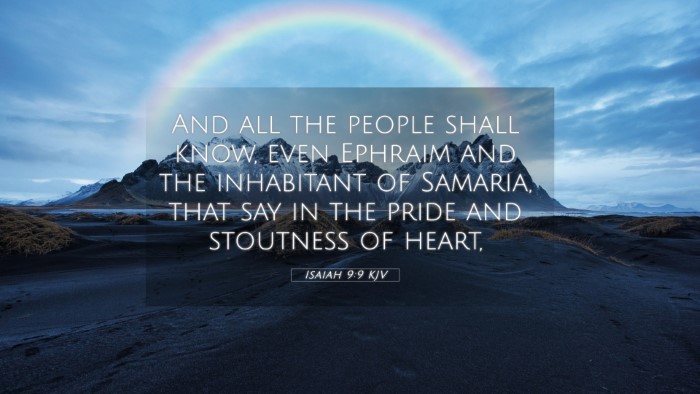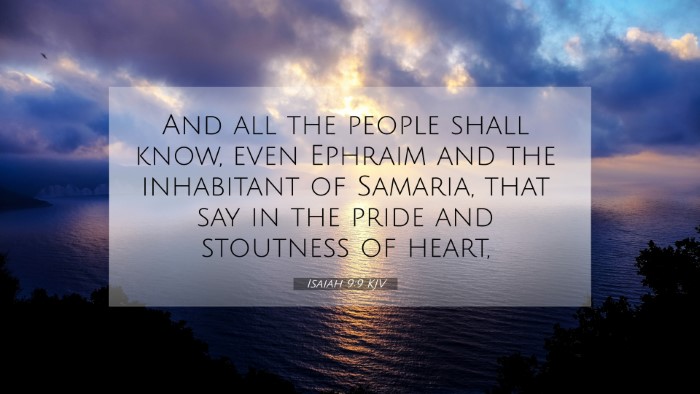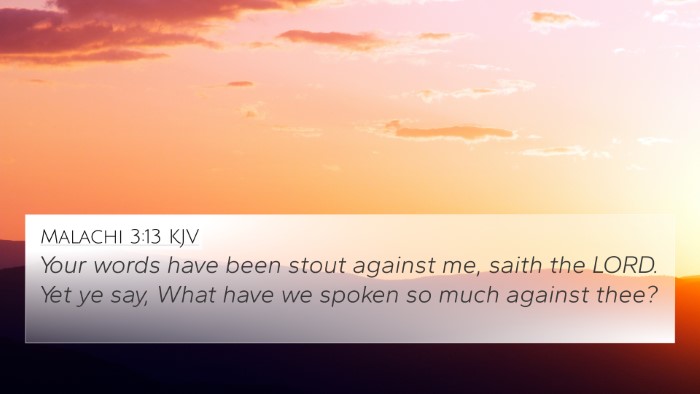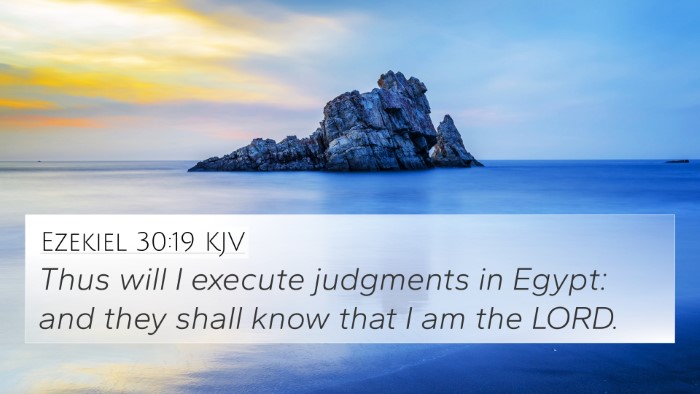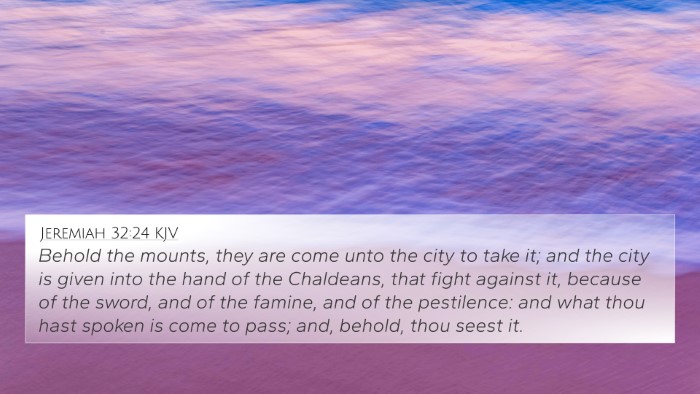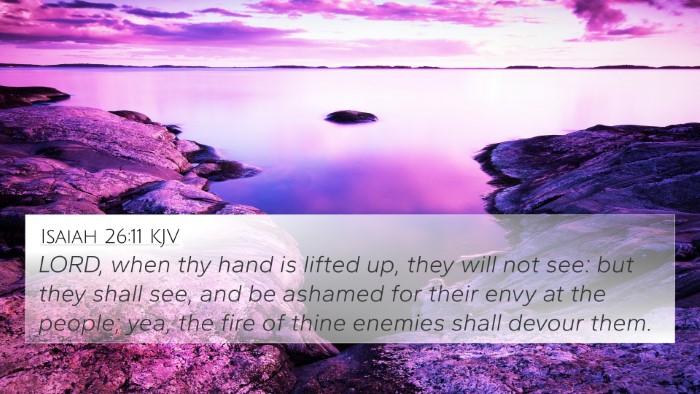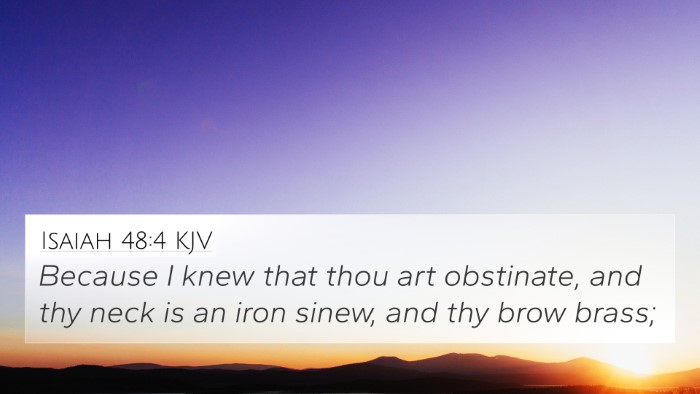Understanding Isaiah 9:9
Isaiah 9:9 is a significant verse in the Old Testament that highlights the state of Israel during troubled times, reflecting on themes of pride, judgment, and the divine promise of hope through a coming Messiah. The verse states:
"And all the people shall know, even Ephraim, and the inhabitant of Samaria, that say in the pride and stoutness of heart."
Summary and Interpretations
This verse emphasizes the collective knowledge of the people of Israel, particularly the tribes of Ephraim and the inhabitants of Samaria, regarding their spiritual and moral condition. The prideful assertion of their strength and the defiance against God’s impending judgment serve as a caution against arrogance.
Key Insights from Commentaries
- Matthew Henry: Henry emphasizes the danger of national pride and the certainty of divine judgment. He notes that the people of Ephraim and Samaria represent those who boast of their might while ignoring their need for God's mercy.
- Albert Barnes: Barnes reflects on the historical context of Israel’s rebellion against God and the resultant prophecy of doom. He warns that their confidence would soon be met with calamity, emphasizing the futility of reliance on human strength over divine guidance.
- Adam Clarke: Clarke discusses the hope mingled within the warning of judgment, noting that the knowledge of their sinful ways serves as a precursor to repentance. He contextualizes the verse within the broader narrative of Israel's struggles and ultimately points to the coming hope that is fulfilled in the Messiah.
Thematic Connections and Cross-Referencing
Isaiah 9:9 serves as a bridge to a deeper understanding of biblical themes concerning pride, judgment, and redemption. Below are biblical texts that relate to and elaborate on the message delivered in Isaiah 9:9:
- Proverbs 16:18: "Pride goes before destruction, and a haughty spirit before a fall." This verse aligns with the pride mentioned in Isaiah 9:9, echoing the consequences of arrogance.
- Jeremiah 50:6: "My people have been lost sheep: their shepherds have caused them to go astray." This reference complements the lament over Israel's predicament in Isaiah.
- Hosea 7:10: "And the pride of Israel testifies to his face; yet they do not return to the LORD their God, nor seek him, for all this." This verse emphasizes Israel's unrepentant pride as noted in Isaiah.
- Micah 2:3: Highlighting impending judgment against the arrogant ways of Israel and their leaders, similar to what Isaiah proclaims.
- Isaiah 2:12: "For the day of the LORD of hosts shall be upon every one that is proud and lofty." This verse forewarns of judgment similar to the themes in Isaiah 9:9.
- Romans 1:22: "Claiming to be wise, they became fools." This New Testament parallel illustrates how pride leads to spiritual blindness, mirroring the condition of Israel.
- James 4:6: "God opposes the proud, but gives grace to the humble." This serves as a resolution to the pride that Isaiah condemns, pointing towards grace.
Application and Reflection
The warnings in Isaiah 9:9 invite readers to reflect on the dangers of pride and the importance of humility. As Christians engage with this verse, they are reminded of the necessity of seeking God earnestly, recognizing their dependence on His grace rather than their own strength.
How to Use Bible Cross-References
When studying Isaiah 9:9, consider using a Bible concordance or cross-reference guide to delve deeper into related themes. The following tools can enhance your study:
- Bible Concordance: This resource allows for tracking of keywords and themes across scripture.
- Cross-Reference Bible Study: Engaging in a study that integrates various scriptures strengthens understanding of biblical narratives.
- Detailed Cross-Referencing: Linking between Gospels and epistles can unveil rich theological insights.
Cross-Referencing Biblical Texts
Incorporating cross-references is essential for uncovering the inter-Biblical dialogue that links Old and New Testament teachings. The connections reveal the continuity of God’s message throughout scripture and the fulfillment of prophecies in Christ.
Conclusion
Isaiah 9:9 serves as a potent reminder of the dangers inherent in pride and the critical nature of repentance and humility. By engaging with such scriptures and utilizing tools for cross-referencing, believers can gain a profound understanding of God’s word, enhancing both personal faith and communal teaching.

